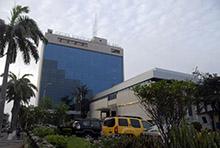
Typical street scene in Santa Ana, El Salvador. (Photo: iStock)
IMF Survey : IMF Opens Second West Africa Center to Build Capacity in Region
March 25, 2014
- Goal is to help officials build skills in economic policy design, implementation
- New center to focus on regional needs and priorities
- Center completes IMF’s network of technical assistance centers in Africa
With the aim of scaling up its support for capacity development in West Africa, the IMF has opened a new regional technical assistance center in Accra, Ghana, the fifth such center in Africa and the ninth worldwide.

Accra’s financial district: IMF’s new regional technical assistance center in Ghana aims to bolster economic policymaking capacity (photo: Newscom)
CAPACITY BUILDING IN AFRICA
Offering capacity building services to six countries across western Africa, AFRITAC West II complements the region’s existing center in Abidjan, Côte d’Ivoire, established in 2003 to serve francophone West Africa.
With the center’s opening, the IMF fulfills its commitment to extend the AFRITAC network to serve all sub-Saharan African countries—a commitment made in 2002 with the IMF Capacity Building Initiative for Africa. The initiative seeks to strengthen the capacity of African governments and institutions to design and implement sound macroeconomic policies consistent with their poverty-reducing strategies.
“This is an important day for capacity building in Africa,” IMF African Department Director Antoinette Sayeh told a gathering to mark the center’s opening in Accra on March 24.
“The IMF launched this initiative with a vision: to give all countries in sub-Saharan Africa access to an IMF regional technical assistance center,” she added, noting that this vision was a response to African heads of state, who recognized the continent would benefit from the transfer of economic skills and the opportunity to share best practices in policymaking.
The new center serves Ghana, Cabo Verde, Liberia, Nigeria, Sierra Leone, and The Gambia. It joins four existing centers—in Abidjan, Côte d’Ivoire; Libreville, Gabon; Dar es Salaam, Tanzania; and Port Louis, Mauritius. Together, the five centers cover all of sub-Saharan Africa.
Tried-and-true model
The IMF’s regional technical assistance centers are widely considered a successful model for capacity building by the international community. A key component to this success is that the technical assistance delivered through these centers is demand driven, responding to the needs of countries, and is closely connected to their poverty-reducing strategies.
Because of the centers’ close proximity to the officials they serve, the capacity building can more quickly be adapted to the beneficiary countries’ evolving needs. “The Regional Technical Assistance Center is a model that is flexible, one where we’re close to the ground,” said Luc Leruth, Center Coordinator for the latest AFRITAC.
The new center will also be able to benefit from the work that is being done at the Africa Training Institute (ATI), which was established in June 2013 in Mauritius. Recently, ATI trainers started to provide short training sessions in AFRITAC East and South in support of technical assistance offered by these regional centers. Such training events work directly with the recipients of technical assistance and, as such, aim at increasing its effectiveness. During the coming year, similar initiatives are envisaged with the other AFRITACs, including AFRITAC West II.
Support for poverty reduction
Technical assistance services offered by the centers both complement and supplement the technical assistance provided by IMF headquarters and are coordinated with assistance provided by other donors. The centers provide a natural platform for harmonization of regulatory frameworks, and adoption of best practices, as well as overall economic integration.
The centers support the implementation of countries’ poverty-reducing strategies in the areas of the IMF’s core expertise: macroeconomic policy, revenue policy and administration, public financial management, monetary policy and operations, financial sector supervision, macroeconomic and financial statistics, and macrofiscal analysis.
The African regional centers provide technical assistance on a grant basis. They are financed by contributions from the beneficiary countries, bilateral and multilateral donors, and the IMF. AFRITAC West II currently receives contributions from Ghana, the host country; the IMF; and donors, including Australia, Canada, China, the European Union, Switzerland, the African Development Bank, and the European Investment Bank.
Local ownership
The governance of the centers is designed to promote ownership of, and accountability for, capacity-building programs. Accordingly, each center is guided by a steering committee for the development of technical assistance strategies and priorities. Beneficiary countries have the majority of the seats on the committee. The committee endorses the center’s annual work plan and provides high-level guidance on strategic issues, such as emerging capacity-building needs in the region.


